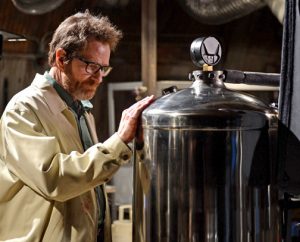Elizabeth Raphaelson, Managing Editor

It’s been over a month since the series finale of Breaking Bad. I’m just assuming at this point you’ve seen it, but if not, PLEASE stop reading here. It was a perfect fruit, which deserves to be eaten accordingly.
Because the peak of the series (even according to producer, Vince Gilligan) was reached at the third-to-last episode, entitled “Ozymandius,” the finale had a different job to do. Yes, we see the minor characters dealt with (a tense scene with Gretchen and Elliot where Skinny Pete and Badger make an appearance) but its main function was to deal the cards for Walt’s fate—a harrowing task for a character who has been the quintessential anti-hero for the past six years.
Walt’s main struggle throughout the series was lacking the concept of “enough.” There was never enough money, never enough power, never enough time and never enough love. Perhaps one of the most satisfying moments of the episode was Walt’s decision to kill off Uncle Jack, knowing that he would lose the rest of the money from the empire he built. It harkens back to the chilling scene in an earlier season, where Walt stands towering over his pile of money, and Skylar pleas, “How much is enough? How big does this pile have to be?”
The door was finally closed on Walter’s campaign for “I’m doing it for the family,” and what a great moment it was! In an eerily jaundiced-looking room, he croaked to Skylar, “I did it for me. I liked it. I was good at it. And, I was really… I was alive.” It almost made you sympathize with him; he was finally being honest, and the guy found a way to make dying of cancer make him feel alive.
Jesse’s box dream sequence was one of the most powerful moments in the evolution of his character. Back when Jesse was in therapy, he had told his counselor that if he had all the time and money in the world, he would want to build something with his hands. He reminisced about the joy a perfect box he made in shop class brought him and painfully states that he ended up trading it for an ounce of weed. In the dream sequence, Jesse is building a perfect wooden box, and when he awakes, finds himself prisoner of another type of box.
A million theories popped up about the mysterious name of the episode, “Felina.” After the finale, Gilligan appeared on The Colbert Report and discussed the name. The great Marty Robbins’ song “El Paso” inspired the title and was played in the car Walt stole in New Hampshire. The lyrics of the song tell of a bandit returning to a town to face his impending doom, all for the love of his girlfriend, Felina (this gets particular bonus points because of Breaking Bad’s penchant for a good western theme–i.e. the episode “Dead Freight.”) As Walt guns it back to New Mexico, the song makes a perfect metaphor: Walt will face his death, if it means the integrity of his lab. And in the final scene where Walt drops dead, he leaves a splatter of his own blood on the equipment.

Many critics claimed that the finale of such an epic in television history fell short of expectations. In some ways, I can identify with this. There was so much to wrap up in such a short time (even though this episode was extended to 75 minutes), and although they put a cap on all the major plot lines and sub-plots, you could tell they set up the series not knowing how much time they would have to explore. For example, we never saw how Walt Jr. coped with the incriminating truths about his father. We didn’t see the full-extent of Marie’s grief for her lost husband, Hank, which had the potential to spin out of control.
However, I felt the ending was nothing short of a perfect fit. It wasn’t groundbreaking, but it left each character off exactly the person they are. Walt Jr. and Holly were left untouched and pure, Skylar was left giving Walt a final chance and Marie became the eternal voice of Hank. Jesse escapes freely and was redeemed as the misguided innocent, and of course, Walt built the contraption that ends up killing him, and in his final moments is left with his one true love: the lab.
When discussing the episode with my brother, he put it best: Walt’s story perfectly parallels that of the course of addiction. Breaking Bad (slang for cooking meth) and extreme self-assertion starts you off feeling grand and glorious—you’re powerful and fast and indomitable—but it’s highly addictive nature soon brings you to a dark place. In the end, I almost feel that Heisenberg had been killed off a few episodes prior, and this episode was all about the death of a broken Walter White.
Something I’ve been noticing a lot lately in Mad Men (another AMC hit) is that they only tell the part of the story that’s necessary. Sometimes the episode ends right before a main event that has been talked about the whole episode (a speech, a Beatles concert, etc). I think Breaking Bad ended in a similarly effective fashion. From the beginning, this show has been about Walt; about his transformation. The question Breaking Bad poses asks if all of the harm and pain Walt has brought to everyone surrounding him is justified by his reasons for doing what he does. The show has two sides to it: Walt’s cause, and the effects. I think the finale concluded both of those stories perfectly. Walt finally admits his true motivations (which was huge) and does what is necessary to get the money to his children, making his struggle over the past 6 seasons finally mean something. Meanwhile, we leave the rest of the characters dealing with the full effects of Walt’s actions. It’s not necessary for us to see how their lives will progress. They’ve done what they were created to do: be the examples of the inevitable collateral damage in Walt’s war. So the finale did what it was intended to do: to bring and end to Walt’s reasons, excuses, and life, and to leave the viewer with a glimpse at all the damage that he had done.
Thanks to my father who informed me concerning this blog, this weblog is in fact remarkable.
Also visit my site :: ashbel indictment
Walter White has a reason and good intention for every action he executes over the course of the
show, even as his actions become increasingly
morally questionable. Amiira Behrendt”), silently making a plan in my head to stop having a relationship with a married man. I thought about what she would look like, how the labor would go and I envisioned our family and friends congratulating us and sharing our joy.